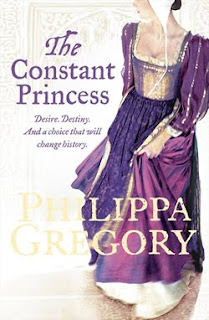 The Constant Princess. Written by Philippa Gregory.
The Constant Princess. Written by Philippa Gregory.Blurb: As youngest daughter to the Spanish monarchs and crusaders King Ferdinand and Queen Isabella, Catalina, princess of Wales and of Spain, was promised to the English Prince Arthur when she was three. She leaves Spain at 15 to fulfill her destiny as queen of England, where she finds true love with Arthur as they plot the future of their kingdom together. Arthur dies young, however, leaving Catalina a widow and ineligible for the throne. Before his death, he extracts a promise from his wife to marry his younger brother Henry in order to become queen anyway, have children and rule as they had planned, a situation that can only be if Catalina denies that Arthur was ever her lover.
Aside: That's right, I'm writing about a book this week. This certainly has nothing to do with me frittering my week away first preparing for the Emerald City Comic Con and then attending it. It's because of...a...deliberate choice...to...change things up. Also for those of you interested there may be pictures to follow. Not that the one has anything to do with the other.
Preconceptions: I need to make a confession. After the dual review Doomwen
 ch and I did of The Other Boleyn Girl, I read the book. No harm in that, surely. Then I read the next one. And then I kept reading. Now, I'm watching The Tudors (the True Blood of historical fiction shows). I don't know how I got suckered into paying attention to this particular period of history. Given that it's romanticized to a ridculous degree, you'd think I'd pooh-pooh it, but suckered in I have been. Mostly, I've just felt well deserved shame regarding the (trashier than usual) turn my reading has taken. But I felt substantially less shame after reading the Constant Princess.
ch and I did of The Other Boleyn Girl, I read the book. No harm in that, surely. Then I read the next one. And then I kept reading. Now, I'm watching The Tudors (the True Blood of historical fiction shows). I don't know how I got suckered into paying attention to this particular period of history. Given that it's romanticized to a ridculous degree, you'd think I'd pooh-pooh it, but suckered in I have been. Mostly, I've just felt well deserved shame regarding the (trashier than usual) turn my reading has taken. But I felt substantially less shame after reading the Constant Princess.General Review: Alright, lets get this out of the way: the Constant Princess has very little to do with what probably happened in the life of Katherine of Aragon. Oh, it touched on a few bits of historical fact, but a lot of it was clearly lies and deceit. More importantly, it was interesting lies and deceit. In case it isn't apparent: you shouldn't read the Constant Princess in lieu of historical education. Or take it internally in lieu of medicine.
What the Constant Princess lacked in historical accuracy it made up for in story telling. Most stories about Katherine make Anne Boleyn look like the interesting one and Katherine nothing more than the put upon, graceful and aging queen. This might be an entirely true take on what actually happened, but Gregory's story about Katherine as a stubborn ambitious woman was something I hadn't seen before and a very interesting read. Gregory's time line of Henry VIII turning from a pampered boy to a wife-killing tyrant was believable and well thought out. The slow transformation felt natural and was a fascinating character piece.
I've broken my own rule (again) and read a bit of criticism of this book. A lot of it talks about the inaccuracies and particularly how unlikely it is that Katherine would come to believe that the Spanish/English Christians and the Muslim Moors could live in peace. While I certainly agree that this is fairly unlikely in history, it makes for an excellent story about a woman coming to understand that her parents are flawed and fallible. The Constant Princess is an excellent character piece. The growth of Katherine and the regression of Henry are wonderfully portrayed and make a damned good foil for each other.
Gregory's language is lush (sometimes crossing the line into florid country, this is a Historical Romance after al
 l). She also sometimes nails her repetitions in too hard for my tastes. As a style choice, it got on my nerves and as a "remind the audience what has happened" technique it really got on my nerves. The book is only some 400 pages long, I remember what you said last chapter and so does everyone else.
l). She also sometimes nails her repetitions in too hard for my tastes. As a style choice, it got on my nerves and as a "remind the audience what has happened" technique it really got on my nerves. The book is only some 400 pages long, I remember what you said last chapter and so does everyone else.Of all the Tudor books (and I'm nearly finished the series now) this is far and away my favourite. Not many writers or film makers have spent time on Katherine before Anne Boleyn came onto the scene, and it turns out it's well worth exploring. I'd recommend this highly to anyone else who's willing to remove the dust jacket to avoid the shame of trashy reading.




I really enjoyed this book mostly I think because it looked at Katherine in a completely different light. Special bonus for me - after a while I started feeling sorry for her for just having to live that life instead of just feeling bad that she got the short end of the stick in the husband department...
ReplyDeleteThe more people talk about this book, the more I think I want to read it. Now if someone can point me in the direction of a sympathetic book about Anne Boleyn...
ReplyDelete